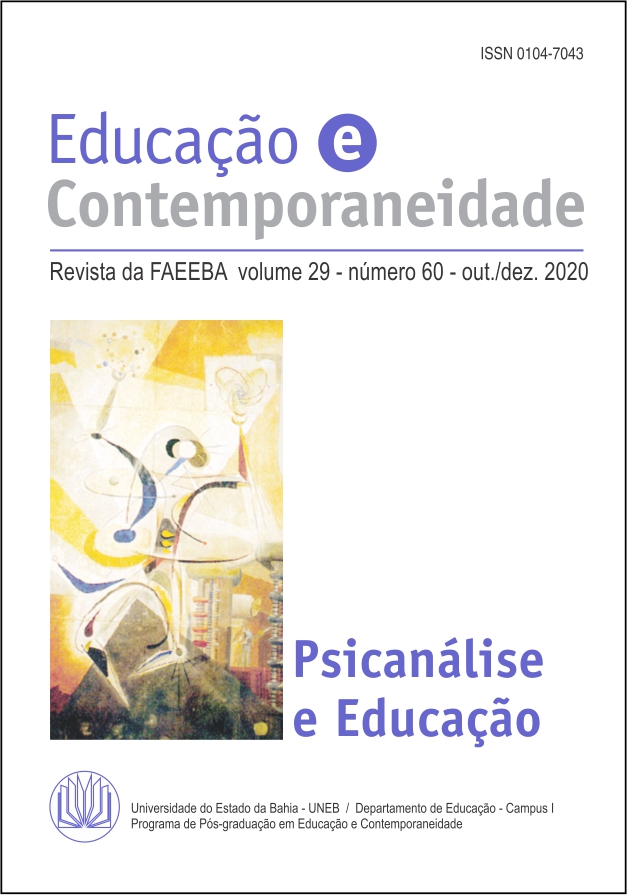La formation des enseignants a la lumiere de la psychanalyse1
DOI:
https://doi.org/10.21879/faeeba2358-0194.2020.v29.n60.p117-126Keywords:
Education, Psychanalyse, Analyse, PratiqueAbstract
This article attempts to assess the impact of specific methods, inspired by psychoanalysisin the training of teachers and education professionals. It deals with the issues of subjectivity and the nature of the “subjects” of professional practice, the professionalization ans also the professional “identity”. It analyzes the transition from actor to subject in its capacity to transform irrational and unconscious (albeit operationally programmed) behaviour into more rational action. The article highlights a specificity of the psychoanalytical approach. Indeed, the problematization process influences uniquely the way the problems of thought, action and existence are questioned. Under these conditions, the approach to the subject is therefore inseparable from the nature of the object (epistemology); it leads to a reflection on action and on its capacity to transform the subject in and through action. Finally, this approach is based on the Freudian anthropological conception of impulses, of their destiny, and on the capacity of the human being to master them in order to survive. The article points out the threats to this lucid, daring and yet cautious approach.
Downloads
References
ABRAHAM, A. L’identité professionnelle et ses enjeux. In: CAGLAR, H. (dir.). Être enseignant. Un métier impossible? Hommage à A. Abraham. Paris, L’Harmattan, 1999. p. 111-121.
BARUS-MICHEL, J. Le sujet social, étude de psychologie sociale clinique. Paris: Dunod, 1993.
BERENSTEIN, I.; PUGET, J. Psychanalyse du lien, dans différents dispositifs thérapeutiques. Toulouse: Eres, 2008.
CASTORIADIS, C. Epilégomènes à une théorie de l’âme que l’on a pu présenter comme science. L’inconscient, Paris, n. 8, p. 47-87, 1968.
CHAMI, J. La personnalité professionnelle, interrogée dans les dispositifs d’analyse des pratiques. Revue Connexions, n. 86, p. 67-83, 2006
CIFALI, M. Le lien éducatif: contre-jour psychanalytique. Paris: PUF, 1994.
FILLOUX, J.-C. Champ pédagogique et psychanalyse. Paris: PUF, 2000.
FREUD, S. L’intérêt de la psychanalyse. In: FREUD, S. Résultats, idées, problèmes. Paris: PUF, 1984. p. 212-213.
FREUD, S. Un souvenir d’enfance chez Léonard de Vinci. In: FREUD, S. Ouvres completes, t. X. Paris: PUF, 1910. t. X.1. p. 2-105.
FREUD, S. Le Moi et le Ça. G.W. XIII. 1923. p. 287.
FREUD, S. Malaise dans la civilisation. Paris: PUF, 1929.
KAËS, R. Réalité psychique et souffrance dans les institutions. In: KAËS, R. L’institution et les institutions. Paris: Dunod, 1987. p. 1-46.
KAËS, R. Et al. Désir de former et formation du savoir. Paris: Dunod, 1976.
MENDEL, G. L’acte est une aventure. Du sujet métaphysique au sujet de l’acte-pouvoir. Paris: La Découverte, 1998.
MICHELOT, C. L’action rationnelle, essai sur l’étude et la résolution de problèmes. Saarbrücken: Editions Universitaires Européennes, 2016.
OLLIVIER, B. L’acteur et le sujet. Vers un nouvel acteur économique. Paris: DDB, 1995.
PALMADE, G. Préparation des décisions, l’étude des problèmes. Paris: L’Harmattan, 2008.
RICOEUR, P. De l’interprétation, essai sur Freud. Paris: Seuil, 1965.
TOURAINE, A. Le retour de l’acteur. Paris: Fayard, 1984.
Published
How to Cite
Issue
Section
License
O encaminhamento dos textos para a revista implica a autorização para a publicação.
A aceitação para a publicação implica na cessão de direitos de primeira publicação para a revista.
Os direitos autorais permanecem com os autores.
Após a primeira publicação, os autores têm autorização para a divulgação do trabalho por outros meios (ex.: repositório institucional ou capítulo de livro), desde que citada a fonte completa.
Os autores dos textos assumem que são autores de todo o conteúdo fornecido na submissão e que possuem autorização para uso de conteúdo protegido por direitos autorais reproduzido em sua submissão.
Atualizado em 15/07/2017

















































